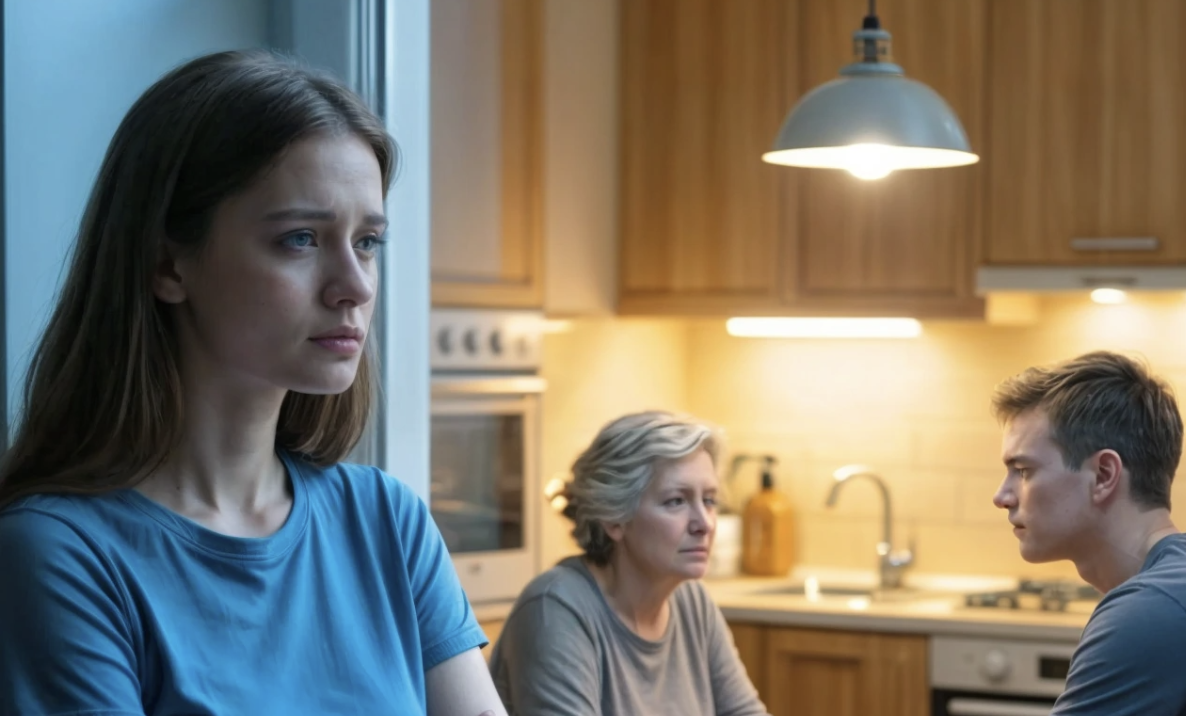The aroma of bay leaf and cumin, so familiar and cozy, suddenly pierced her consciousness like a sharp prick. Elena froze halfway to her apartment, unconsciously squeezing the cold metal keys in her palm. In the chaotic rush that morning, getting her son ready for kindergarten and trying not to be late for an important meeting, she had completely pushed out of her mind one simple but crucial detail. She hadn’t turned off the stove. The soup was still simmering over low heat—the very soup her husband, Alexei, loved so much, with beef and root vegetables.
Her heart began to beat faster, pounding a nervous rhythm in her temples. In her mind’s eye, anxious images floated up, fuzzy around the edges but filled with horror. Dark, acrid smoke swirling under the ceiling. Fire hungrily licking the curtains. The frightened faces of neighbors. Loud, overlapping shouts. And all of it would be her fault, because of one small oversight that could have turned into irreparable disaster.
She practically flew into the hallway, breathless from running up the stairs. The air in the apartment was clear; it smelled only of that same soup. Snatching the large pot from the burner, she saw that the broth had only slightly boiled down, leaving a dark residue along the sides. Thank God, it had all worked out. Nothing terrible had happened. She was about to exhale, feeling the weight drop from her chest, when she heard muffled voices coming from the living room. Voices that should not have been there at that time of day.
She froze in place, turning into pure listening. From behind the half-open door, familiar tones drifted out. Her mother-in-law, Anna Viktorovna, and her husband, Alexei, were sitting in the kitchen. They were sure Elena was still at work, that she wouldn’t be back for another couple of hours.
“I told you from the very beginning,” came Anna Viktorovna’s even, methodical voice, “she’s not the right match for you. A girl with no roots, no support, no solid ground under her feet. What did you see in her? A passing infatuation that just dragged on.”
“Mom, how many times do we have to go over this, enough already,” Alexei’s tired reply sounded. “We’ve been together for five years. Five years, do you understand? We have a son growing up, our little Misha. Doesn’t that mean anything?”
“A son is, of course, a big deal,” Anna Viktorovna threw back, her tone cold, almost icy. “Only there’s no guarantee he’s actually yours.”
Elena felt a chill inside. It was as if a swarm of invisible icy spiders ran down her back. Instinctively, she took a step back, into the darkness of the hallway, trying to breathe as quietly as possible, almost holding her breath.
“What are you saying?!” Alexei cried out, his voice breaking on a high note. “Have you completely lost your mind? What are you even talking about?”
“Ask her yourself,” his mother continued imperturbably. “I saw her with that… what was his name… with Artem, with my own eyes. It was before your engagement, just a couple of months before.”
Elena dug her fingers into the doorframe, trying to keep her balance. Her vision dimmed for a moment. Artem… Yes, he had been in her life. Before Alexei. But their relationship had ended six months before that fateful meeting in the coffee shop where she met Alexei. It had all been long over and hopeless. She didn’t want to eavesdrop, didn’t want to stoop to that, but her legs felt rooted to the spot, and her heart was pounding out of her chest, not letting her move.
“Mom, stop it! Enough!” Alexei’s voice thundered, full of pain and anger. “Elena is my wife. And I know perfectly well who my son is. Don’t you dare say anything like that again!”
“Well, well, fine, fine,” Anna Viktorovna smirked, and her laugh was laced with contempt. “Just don’t come running to me with complaints later, when everything comes out.”
Elena stood motionless for a few more minutes, until silence settled in the living room. Then, quietly, like a ghost, stepping soundlessly across the floor, she slipped out of the apartment and pulled the door shut behind her. The soup, the stove, the fear of fire—all of it instantly lost any importance, dissolving like smoke. Only one enormous, all-consuming pain remained, spreading through her entire being.
That evening, Alexei came home as usual. He found her sitting by the large living-room window, looking out at the lights of the evening city. Her eyes were red and swollen; she didn’t even try to hide it.
“You heard everything that day, didn’t you?” he asked quietly, stopping beside her.
She only nodded silently, unable to say a word, staring at his reflection in the dark glass.
He came closer and gently took her cold hand into his warm palms.
“I don’t believe her. Not a single word. You need to know that.”
“But the doubt… it’s already been planted,” she whispered, her voice trembling. “It’s already here, in our home, between us. And that’s the worst thing that could have happened. A snake that will quietly whisper in your ear.”
Days passed—thick, joyless. They lived under the same roof, but as if separated by an invisible glass wall. Their conversations became rare and purely practical, concerning only Misha’s schedule or shopping. Anna Viktorovna would drop by from time to time as if nothing had happened, chattering about trivial things, playing with her grandson, pretending that conversation had never taken place. And Elena more and more often caught her husband looking at her—a thoughtful look, full of unspoken questions and involuntary anxiety. That look cut her deeper than any words.
And then one evening, when Misha was already asleep, Alexei walked into the room holding a thick white envelope. He placed it on the table in front of her.
“What’s this?” Elena asked quietly, feeling everything inside her tighten.
“A test,” he answered just as softly. “Those tests.”
She held her breath. The whole world shrank to that envelope lying on the table. Slowly, almost mechanically, he opened it, took out a sheet of paper, and handed it to her. She took it with trembling fingers. Her eyes ran over the lines, the numbers, the official terms, and stopped on one single line, printed in clear black letters: “Probability of paternity: 99.999%.”
He lifted his gaze to her, and in his eyes she saw not triumph, but endless weariness and pain.
“I needed to put this to rest once and for all. Destroy this shadow. For myself. For us. So it would never come between us again.”
And then she cried. Quiet, soundless tears of relief. They were not tears of hurt or anger. They were tears of release—from the crushing weight, from the nightmare they had been living in for those few weeks.
The next day the phone rang. It was Anna Viktorovna. She spoke in her usual tone, as if nothing had happened, telling her about some sale in a store.
But Elena, listening to her, simply said calmly and very softly:
“Thank you, Anna Viktorovna. Thank you for showing me the truth that day. Now I know for certain who really stands beside me in the darkest moments, and who merely plays roles, living a borrowed life full of ghosts and illusions.”
And from that moment on, their paths finally diverged. They never spoke again. And into their home, after a long winter of misunderstanding, the sun at last returned, melting the ice of silence, and the air once again smelled only of soup and happiness—happiness that turned out to be so solid no storm could destroy it. They learned to cherish a silence filled with trust and the kind of glances in which there was no longer any room for shadows



